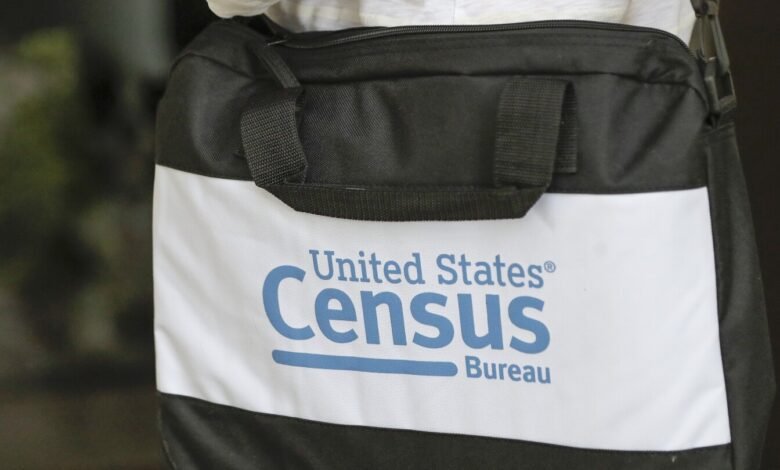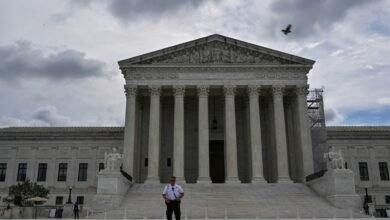Republicans renew effort to exclude noncitizens from census that helps determine political power

Some Republicans in Congress are pushing to demand a citizenship question on the annual census questionnaire and exclude people who are not citizens from the count that helps determine political power in the United States.
The Republican-led House was expected to vote on Wednesday on Equal Representation Law which would eliminate noncitizens from the count collected during a census and used to decide how many House seats and Electoral College votes each state would get. The bill is unlikely to pass the Democrat-controlled Senate, the White House is opposed and there are legal questions because the Constitution says all people must be counted during the apportionment process.
But the proposal raised alarms among redistricting experts, civil rights groups and Democratic lawmakers as a reprise of the Trump administration’s efforts to impose limits that would dramatically alter the dynamics of the census, which plays a key role in distributing political power. and federal funding.
Still, opponents say the idea, once on the ideological fringe, never made it this far in the legislative process.
In March, senators rejected similar Republican-sponsored language in an appropriations bill. That effort was seen as an effort to bolster the Republican agenda on immigration ahead of the November elections, with Donald Trump as the party’s presumptive nominee against Democratic President Joe Biden.
What to know about the 2024 elections
“It’s getting closer to reality than ever before,” said Steve Jost, a former Census Bureau official in the Obama and Clinton administrations. “This is part of a cohesive Republican Party strategy … to gain every advantage possible when the country is so divided.”
The 14th Amendment requires that congressional seats be apportioned among the states “according to their respective numbers, counting the entire number of persons in each State.” In addition to helping allocate congressional seats and Electoral College votes, census numbers guide the distribution of $2.8 trillion in federal money.
“We ask all kinds of questions about the census anyway, so what’s wrong with asking, ‘Are you a citizen?’” Rep. Jim Jordan, R-Ohio, said Wednesday during the debate in the Chamber plenary.
Similar efforts failed before the last census in 2020, when the Supreme Court blocked the Trump administration from adding a citizenship question to the census form. After that defeat, the Trump administration attempted to discern the citizenship status of each US resident through administrative records and sought to exclude people who were in the US illegally from the count used to apportion seats in Congress.
Biden, in one of his first acts as president in January 2021, signed two orders repealing these Trump directives.
During a House Rules Committee hearing on Monday, Rep. Michael Burgess, R-Utah, said that including noncitizens in the country’s head count “misrepresents American citizens” and is linked to the “border crisis ” from Biden because it helps places with large numbers of people who are not citizens.
“Localities that are sympathetic to the president’s agenda are poised to benefit directly,” Burgess said.
According to critics, the issue of citizenship was inspired by the late Republican redistricting expert Tom Hofeller. He had written that using the population of voting-age citizens rather than the total population for purposes of redrawing congressional and legislative districts could be advantageous to Republicans and non-Hispanic whites.
Republican supporters of the legislation say counting people who are in the U.S. illegally helps Democrats.
Knowing how many people are not citizens in the U.S. is “the best way to get accurate information,” Rep. Andy Biggs, R-Ariz., said at the hearing.
If Trump becomes president, his administration could take steps to add a citizenship question without committing the procedural errors cited by the Supreme Court in its 2019 decisionsaid Jeffrey Wice, a redistricting expert.
“This is really a repeat of the fight that Trump started,” Wice said. “They will have more time, if he wins in November, to avoid mistakes and go through a much more deliberative census planning process.”
The Biden administration says the GOP bill would increase the cost of conducting the census, make it more difficult to obtain accurate information and violate the 14th Amendment.
Results of a Census Bureau simulation last year indicated that a significant number of noncitizens were not included in the 2020 census. Some civil rights groups said this was evidence that the Trump administration’s pressure on the citizenship question contributed to an undercount of some minorities racial and ethnic.
“The Constitution is the Constitution,” Rep. Jamie Raskin, D-Md. he said during the debate on Wednesday. “The rest of this strikes me as election year rhetoric.”
___
Follow Mike Schneider on X, formerly known as Twitter: @MikeSchneiderAP.




